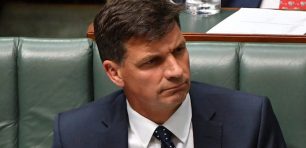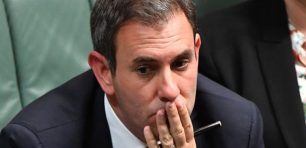
Atlassian co-founder Mike Cannon-Brookes. Source: Supplied.
Atlassian co-founder Mike Cannon-Brookes has become the largest shareholder in AGL Energy and vowed to stop its demerger, less than two months after his failed bid to buy the energy titan.
Cannon-Brookes’s private investment group Grok Ventures acquired 11.28% of AGL’s shares yesterday, and the tech billionaire immediately promised to vote against the high-profile demerger that would see the energy group split into a retail business called AGL Australia and a coal generator called Accel Energy.
Under the demerger proposal, AGL’s coal-fired power stations would continue to operate under Accel Energy’s purview until 2045, while the retail company would continue to support some 4.5 million customers.
It will go before the board next month for a vote — but the cap-clad boffin isn’t waiting ’til then to show his cards.
“We intend to vote every AGL share we control at the relevant time against the demerger, and we call on fellow AGL shareholders to vote against the demerger to avoid further value destruction,” Cannon-Brookes said in a strongly-worded press release.
It continued that AGL’s board “has made a series of mistakes and was far too slow to act on decarbonisation or adopt new technologies, which has resulted in this sub-optimal demerger plan”.
As a result, the demerger would see two “weaker, interdependent companies with significant operating risk and dis-synergies” meaning Accel Energy would likely fail to fund its transition because of the high leverage, thermal coal exposure, big remediation costs and a low appetite for coal exposure from equity and debt investors.
Cannon-Brookes — who is one of Australia’s wealthiest people — has made his intentions to see coal-fired power end faster in Australia clear from the outset.
In February he launched an audacious bid to take over AGL to make it greener faster — but was rebuffed by AGL’s board on the grounds that his offers were not high enough.
Some called it an extraordinary move from Cannon-Brookes, one-half of the brains behind software company Atlassian, but it’s hardly out of character for the savvy 42-year-old who in 2002 started the company with Scott Farquhar straight out of university — using credit cards.
Atlassian has already committed to running its operation entirely using renewables by 2025.
Aside from the climate imperative — AGL is the single largest contributor to carbon emissions in Australia — Cannon-Brookes has long held the view that it makes good economic sense to transition to renewables as those energy sources become cheaper and more widely available.
“We are at a critical point in Australia’s energy transition, and in AGL’s future,” he said.
“This is about delivering cheap, reliable and clean energy to millions of families and businesses.
“We believe by keeping the company together, AGL can continue its long and proud history as a pioneer through energy market transitions.”
But AGL stated it was committed to the demerger in a letter published on the Australian Stock Exchange.
“[It] creates the potential to maximise growth in the value of shares by giving each company the freedom to pursue individual strategies and growth initiatives.”
“The demerger will create two industry-leading companies that will advance Australia’s new energy future, enabling a responsible transition of Australia’s energy system towards decarbonisation.”
Cannon-Brookes wasn’t buying it, saying Grok “fundamentally believe there can be a better future for AGL”.
“A future that accelerates the transition to net-zero and a future that creates opportunities for AGL and value for its shareholders along the way,” he said.
Handpicked for you

Election 2022: Labor and the Coalition disagree on the direction of power prices, so who’s right?



COMMENTS
SmartCompany is committed to hosting lively discussions. Help us keep the conversation useful, interesting and welcoming. We aim to publish comments quickly in the interest of promoting robust conversation, but we’re a small team and we deploy filters to protect against legal risk. Occasionally your comment may be held up while it is being reviewed, but we’re working as fast as we can to keep the conversation rolling.
The SmartCompany comment section is members-only content. Please subscribe to leave a comment.
The SmartCompany comment section is members-only content. Please login to leave a comment.